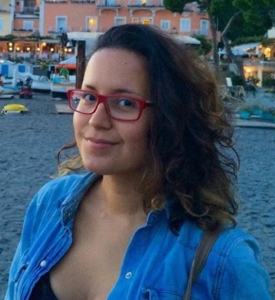Cappuccino Take U-E
I bought you a sword.
It’s weird, I know, and it cost me seventy-five euro that I don’t have, and I’m not sure how I’ll get through security with it. But I’m bringing it home for you because your birthday is in a few weeks and I wanted to bring you home something special from a place I know you’ll never go.
And then I’m breaking up with you.
“Posso avere un taxi per l’aeropuerto, per favore.”
On the line, I hear the distant tapping of the dispatcher’s keyboard. I’m pleased with how easily my Spanish has informed my Italian. In the dark reflection of the huge double-paned window in the bedroom I share with two other girls, I can see the buttons on my prepaid Nokia glow green against my cheek.
“Sì,” I respond, twisting the handle to push the window open. I’ve spent so many nights balancing up here on the wide ledge of the sill, fishing for cell reception, calling 800 numbers on the backs of ripped phone cards to speak to you while everyone else was out at one club or another.
“Due Corso dei Tintori.”
Those calls have been fewer and farther between these last few weeks. I suspect you’ve got to realize that, but if I’m honest, I’ve stopped wondering who it is you’re fighting during your backroom breaks at Best Buy instead of reapplying to your undergraduate program.
I didn’t know white skin could be ashy, but you were; raw dough, stubborn and dry.
When I told you I was going to culinary school in Genoa, your reaction was to laugh, a cold ashy fist against a cloud of menthol smoke.
“Let me guess,” you coughed. “You got financial aid?”
But it wasn’t a question, your eyes already lidded, your lips already sneered.
“Of course you did.”
I didn’t know white skin could be ashy, but you were—raw dough, stubborn and dry.
“Ci vediamo fuori,” I tell the dispatcher on the line. “Grazie.”
I pin my shoulders back against the medieval stone where I sit on the windowsill and inhale the barely pre-dawn air. The morning light is a charcoal blue here in the canyon of renaissance-era palazzos, the waking sun just beginning to stretch in from the cracked lid of night. The neon-clad municipal workers hose down the diagonal-set stones in the road below, preparing for a fresh new day in history.
They don’t eat meatballs and gravy here like you do every Sunday. Did you know that? You can go a whole week without seeing one goddamned tomato. I know. And they pronounce every syllable of their words, here; no muzzarell, mortadell, prosciutt. These—and trust me, I feel the sneer against my teeth as I say this—these are real Italians.
So, yes, I bought you a sword. Because you like to make a big stink about “honor,” and “loyalty,” and because I went with you last year to that place on St. Mark’s to get a sword tattooed under the Italian flag on your upper back. A family crest, you said. Every family had one.
The girls and I have been searching for a club here, a discoteca, that the chefs have been telling us about all semester long, but we never found it. We did find an old bronze plaque in the long atrium of the courtyard next door, though we’d had too many Negroni by that point and none of us were quite sure what it read. Something about fratelli, a brotherhood and a blade, and just off to the right were steps to the leather shop where I decided, on a whim, to buy your sword.
Did you tell your mother I’m studying to be a chef here, I wonder? That I’ve learned to make tortellini from scratch? Or would you pronounce it tortelline?
The cab has arrived. He honks, but it’s a gentle nudge, a first espresso pouring inside porcelain. It’s too early to be angry here. Passionate, you’ve claimed. Across the street, the lights inside the tiny bar on the corner flick on and the elderly shop owner places his cardboard “Cappuccino take U-E” sign on the door.
Attenzione! he’d warn me. Be careful, signorina! It’s strong. They don’t know I’m Puerto Rican, like you do. That my family grew their own coffee on a finca in the mountains. They don’t know I carry caffeine in my blood, a birthright. Your mother, picking up a bacon, egg, and cheese at the corner spot on your block, taught me to never accept coffee from the bottom of the pot.
“It’s sludge,” she growled, eyes wide with disbelief as she shoved my paper cup back into the cashier’s hand.
Does she still refer to me as “the good kind of spic” to the rest of your family? I was arranging a dessert platter for your little sister’s communion when I heard her say that. A melting rainbow cookie in one hand and a chunk of honeydew melon in the other, I froze. Do you remember? Do you remember staring at the nicotine-stained linoleum with me—both of us silent?
My suitcase is heavy as I carefully tug it down the wide staircase, wheels peeling over the smooth stone, worn dull from centuries of humanity: lovers, scholars, fighters. Your sword doesn’t help. But I feel better knowing it’s there; its presence gives me focus, propels me forward, through airport security, through the eight-hour return flight, through bumper-to-bumper traffic on the BQE home.
I bought you a sword you’ll never use from a city you’ll never visit.
Do you know what that’s worth?
Christine Kandic Torres is a writer born, raised, and based in Queens, NY. Her fiction has appeared in Kweli, Catapult, and Cosmonauts Avenue. She has received support for her work from Hedgebrook, the Jerome Foundation, and the Queens Council on the Arts. She lives in Jackson Heights where she is seeking representation for her first novel.





